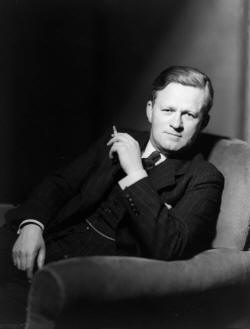

Partner John Simpson
Queer Places:
Boytons, Boyton's Ln, Saffron Walden CB10, UK
6 Lowndes Pl, Belgravia, London SW1X 8DB, UK
Windsor Castle, Windsor SL4 1NJ, UK
17 Victoria St, Brighton BN1, UK
 (Henry)
Hector Bolitho (28 May 1897 – 12 September 1974) was a New Zealand author,
novelist and biographer, who had 59 books published. Widely travelled, he
spent most of his career in England.
(Henry)
Hector Bolitho (28 May 1897 – 12 September 1974) was a New Zealand author,
novelist and biographer, who had 59 books published. Widely travelled, he
spent most of his career in England.
Hector Bolitho was born and educated in Auckland, New Zealand, the son of Henry and Ethelred Frances Bolitho. He travelled in the South Sea Islands in 1919 and then through New Zealand with the Prince of Wales in 1920. He left his country of birth. He had been shocked at the arrest and imprisonment of his boyhood mentor Charles Ewing Mackay, who had seriously wounded a man to whom he had made homosexual advances.
Bolitho lived in Sydney from 1921 to 1923,[1] where he became editor of the Shakespearean Quarterly and literary editor and drama critic of the Evening News in Sydney.[2]
He also travelled in Africa, Canada, America, and Germany in 1923-4, finally settling in Britain where he was to remain for the rest of his life.
On his arrival in Britain he worked as a freelance journalist. For eight years he lived in the cloisters of Windsor Castle, with unrestricted access to the Royal Archives. His discovery of Prince Albert’s unpublished letters to Queen Victoria led to the publication of his first international bestseller, Albert the Good (1932). A few years later his King Edward VIII: His Life and Reign (1937) was published three months after the December 1936 abdication. Hector was severely critical of the former monarch, which provoked scathing condemnation by Winston Churchill.
Hector shared his life and his home with John Simpson. Hector described John as his ‘secretary’, which was then a common euphemism for gay partner. It is possible that they had a relationship which lasted into the war. In 1943 Hector wrote Combat Report as a loving tribute to John (who is identified in the book only as ‘John’, his surname is omitted). In the book he described the start of their ‘relationship’ in 1934 when Hector was 37 and John was 21. At this time Hector had started work on his biography of James MacKay, the first Lord Inchcape. John provided Hector with the help he needed, becoming his ‘secretary’ and librarian. In Combat Report Hector described the close relationship John had with his mother, ‘a lovely, intelligent woman’ and how, in September 1934, John took off his bowler hat, put away his folded umbrella, and set up home with Hector in a house called ‘Boytons’ in Hempstead, Saffron Walden in Essex.
In A penguin in the eyrie: An R.A.F. diary, 1939-1945, Bolitho movingly recalled Ian Gleed’s prewar visits to his home in Essex: ‘The picture I suddenly recall is of myself at a desk, looking out at Ian playing with my Dalmatian on the lawn. They were both at the puppy-dog stage and had much in common. His enthusiasms were enchanting.’
At the start of World War II he joined the Royal Air Force Volunteer Reserve (RAFVR) as an intelligence officer with the rank of squadron leader, editing the Royal Air Force Weekly Bulletin, which in 1941 became the Royal Air Force Journal. In 1942 he was appointed editor of the Coastal Command Intelligence Review. In September 1939 he was attached to the Air Ministry in London with another homosexual literary figure, David ‘Bunny’ Garnett of the Bloomsbury Group. Hector found Garnett ‘bewildering but charming. Shy, I imagine. But I am shy of him. Working with somebody one has respected for so many years is a bit intimidating. I don’t like seeing my writing gods too close.’
In 1940 John was appointed a flight commander and for his bravery in the Battle of Britain he was awarded the DFC for showing courage and skill and for setting an excellent example. On 29 July 1941 Hector attended the presentation ceremony at Buckingham Palace with John and his mother, as well as John’s sister Ruth. If Hector and John did have a relationship it did not survive John’s postings abroad to Gibraltar in 1942 as a wing commander and to North Africa in 1943 as a group captain. In 1945 John married, but in 1949 at the age of 36 he committed suicide, shooting himself in the head in London’s St James’s Park. Newspapers reported that at the inquest his wife told the coroner her husband was worried that headaches he was suffering following a car accident would cause him to have to give up flying, which he loved. A verdict of ‘Suicide while his balance of mind was disturbed’ was recorded.
Bolitho undertook several lecture tours of America (in 1938-39, 1947, 1948, and 1949) and he also revisited Australia in later years.[1]
In 1949 Bolitho began a long and happy relationship with Derek Peel. They were together until Bolitho's death in 1974. Captain Derek Peel, a former public schoolboy and Army officer, had been educated at Wellington College and wounded while serving in the war. They collaborated on a book, Without the City Wall (1952).
My published books: